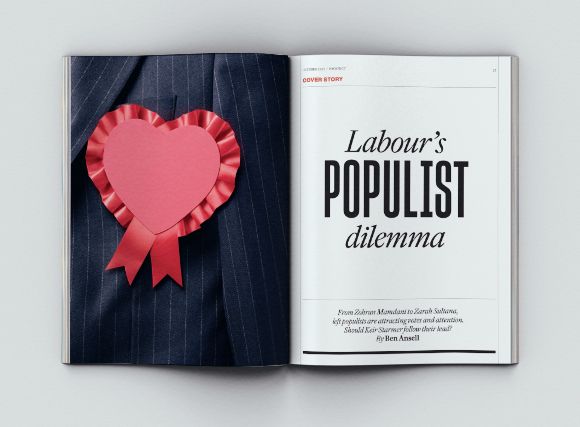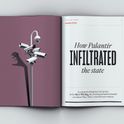Vox popu-lie
Sadly, Ben Ansell’s piece (“Labour’s populist dilemma”, October) does not offer a way forward. I am 81 and have a lifelong interest in politics. I have always been clear what a populist is: someone who tells the electorate what they want to hear regardless of its wisdom, truthfulness or probable consequences, and who won’t say what they need to know but don’t wish to hear. Take the French governments of the mid-1930s that shortened the working week, hindering arms production, and refused to sufficiently grow the professional army, ultimately leaving raw conscripts to face the Germans in 1940. Today you have those arch-clowns Nigel Farage and Boris Johnson.
Pessimists like me have long doubted the electorate’s willingness to face Britain’s declining place in the world. As long as the west largely retained the benefits of the Industrial Revolution and Empire, buying off citizenry with governmental largesse was an effective strategy. When manufacturers moved to lower-cost economies, especially China, the public loved the cheap goods (save for those who lost their jobs).
But now we find our manufacturing disastrously undermined, our nation’s plastic maxed out and that a disproportionately large number of us—the former baby-boomers—are pensioners placing unprecedented demands on the NHS. Our young are left with educational debt, job insecurity and sky-high costs for childcare and housing, and have stopped having enough children to keep our population in balance. Hence the need for immigrants. Until politicians and commentators force the public to face these facts, I see no hope for us.
Mike Waller, Preston on Stour, Warwickshire
Our political situation is dominated by the rise of Reform and the failure of Labour. Labour’s frontbench has not grasped that the loss of support in working-class areas is directly due to the belief among its election strategists that the working-class voter would always back Labour. Support for Ukip, the Brexit Party and now Reform showed this was a fallacy, along with the mistaken idea that such voters were confirmed right-wingers who would only damage the Conservatives by moving their vote.
Keir Starmer’s decision to appoint former Sun editor David Dinsmore as his chief communications officer (“Why has a former Murdoch executive been appointed to run government communications?”, Prospect online, August) is not alone in showing a complete contempt for Labour values. An even bigger issue is the decision to effectively purge the left in the belief that they had nowhere to go. Jeremy Corbyn and Zarah Sultana’s new party claims 700,000 interested contacts, which is enough to cause a failing Labour real problems.
In the United States, the failings of the Democratic party allowed Donald Trump to take the White House. While Joe Biden foiled Trump once, his presidency was only ever going to be a stopgap while the Democrats tried to understand the ongoing crisis of Trumpism. The Biden era wasted this opportunity and it became clear the Democrats had no idea of the depth and seriousness of the Trump phenomenon, which has effectively torn up the US constitution.
Trevor Fisher, Stafford
In light of recent events, Ben Ansell’s suggestion that Angela Rayner could have a role as a competent left populist Labour MP, or perhaps even leader or prime minister, and his mentioning of stamp duty as one of the wealth taxes the British public finds most unfair, now appears more than a little ironic. The public clearly thinks that a government minister not paying sufficient stamp duty is unfair, perhaps especially when it’s a left-leaning minister who claims to hate class inequality and ministerial “privilege”. Rayner’s case is yet another example of the hypocrisies and double-standards we’re all so weary of in Britain’s politicians.
It seems to me that populism—whether left or right—is what arises when a state of political stagnation or prolonged inaction is reached, or when politicians are perceived as little or nothing but self-serving. This is solely the result of the failure of elected politicians to deliver what the electorate expects.
Unlike Ansell, I can see no point in endorsing politicians such as Gavin Newsom and Zack Polanski who engage in trolling on social media or who produce mocking, tit-for-tat videos as a means of insulting and belittling political rivals, confronting their unsavoury policies or cynically trying to win new voters. The seemingly endless cycle of unconstructive, poisonous negativity that such activity generates may be titillating to some in the short term, but it will never resolve any serious political or societal issues. Moreover, such vengeful and childish pursuits can only make things worse. Why intentionally create any more political and social division and upheaval when there is already far too much of it?
Stefan Badham, Portsmouth
The perils of private school
I have served as a governor for many years both in my children’s state school and in a local nursery. I have seen how state schools benefit when they can attract wealthy parents (“Cash for access”, October). The idea that the private system helps state education because it reduces the number of children using state schools is nonsense. Improving state education needs thousands of articulate and influential parents who have skin in the game because they are using the state system. Private schools prevent this.
In several Nordic countries private schooling is heavily regulated. Their excellent state education ensures these countries punch above their weight culturally and technologically. By contrast, in the UK private schools degrade the state system by depriving it of the potential advocacy and support of a vocal clientele. State education in Britain is underfunded and underperforming. Worse, it is used as a playground for half-baked initiatives that would not be tolerated in private schools. Opting for private education is a dereliction of duty by the most literate and knowledgeable in our society. Their actions drag down the country by undermining the education of the next generation.
David Cooper, Newbury
Palestine after recognition
Following a wave of announcements about intended recognition of Palestinian statehood (“Lessons from Bosnia for Palestinian statehood”, Prospect online, September), the Israeli government has sought to “bury the idea of a Palestinian state” with its E1 West Bank settlement plan and the escalation of the war of annihilation in Gaza. It knows that if we despair, we won’t act.
As Friends of Standing Together, the largest progressive grassroots Jewish-Palestinian group in Israel, we aren’t giving up. Since Hamas’s massacre on 7th October, Standing Together has fought for the Hamas hostages’ freedom, a ceasefire and a political process for a just peace. We have made a real difference on the ground: blocking violent settlers’ attacks on Gaza aid trucks, defending Palestinians in Jerusalem from far-right pogroms and forcing mainstream Israeli media to cover starvation in Gaza.
The forces of peace are growing. That’s why, in a recent parliamentary appeal signed by nine MPs and peers from three parties, we urged the following measures to support them: one, to amplify the work of organisations like Standing Together and send representatives to gatherings like the People’s Peace Summit, which 10,000 people and 60 organisations attended; two, sanction far-right officials and groups responsible for violence and incitement against Palestinians and groups like Standing Together; three, revoke licences for exporting weapons to Israel and stop military support for Israel; four, fill the gaps in sanctions against West Bank settlements; and five, accompany or lead convoys of aid to Gaza. Governments must now challenge the policy of starvation.
The most effective way to act is to listen to and stand with activists on the ground, such as Standing Together. The UK government must start by following these five steps.
UK Friends of Standing Together
For the full text of the letter and list of signatories, see ukfost.co.uk/sep25-letter.pdf
Who’s left in Trumpland?
Monica Marks’s rhetorical goal is noble and worthwhile (“Charlie Kirk and the choice facing the left”, Prospect online, September), yet I find her reasoning questionable. I will limit myself to two main observations.
First, I believe Marks flattens the real differences between actors on the American left in her appeal to an ill-defined “we the people”. At risk of being pedantic, Zohran Mamdani, Bernie Sanders and Kamala Harris are indeed “leading Democrats”, yet any observer of American politics ought to realise that they motivate different voters and have distinct bases of power within the party, while Sanders sits as an independent. (If they even “have power” within the party—New York powerbrokers such as Chuck Schumer and Hakeem Jeffries still refuse to endorse Mamdani despite the mandate he received in the New York City mayoral primary.) Navigating these political distinctions seems especially relevant when making a “controversial but crucial appeal to the left”.
Second, Donald Trump is in the driver’s seat. Marks’s call for cross-partisan empathy to “save democracy” in the wake of Kirk’s assassination relies on “principled opposition to political violence” to “help stop this escalation”. That is all well and good, but as her introductory vignette describes, it is Trump and his allies who “are moving American democracy ever closer to the edge” and relentlessly spinning Kirk’s murder as a pretext for authoritarian policies. Is showing empathy to Kirk’s supporters—and presumably causing a groundswell of right-wing opinion—really supposed to ameliorate the latest cynical abuses of an unrepresentative American government?
Ian DeHaven, Georgetown University, Washington DC
Instant calmer
I can relate to Sasha Mudd’s column (“Reading aloud is magic”, October) so well. When my twins were small, I would often respond to bouts of wildness at bedtime by picking them up, placing them on my knees and reading stories. Instant calm. It was better than any parenting advice I had read on numerous (boring) blogs. Now I look back at the many photos of my children, squashed together in my lap, happily absorbed in whatever book I was reading. These images and moments give me much strength.
Josie Glausiusz, via the website
What Rosalind Franklin did
I support the spirit of Susie Dent (Brief Encounter, October) saying “I could pay tribute to the brilliant Rosalind Franklin, whose contribution was written out of the [DNA] story for far too long”, but was disappointed that she chose to highlight Franklin quite as she did. This issue about the discovery of the structure of DNA has become a rather oversimplified trope for feminism, albeit with the very best of intentions, especially when more junior scientists, often female scientists, were—and are—too often overlooked when credit for discovery is given.
First, in 1953, on the next page from Crick and Watson’s seminal paper in Nature was one from Maurice Wilkins’s small team and, next to that, an article from Franklin (with her PhD student Raymond Gosling). Her DNA work was there, published right from the outset of the DNA structure discovery story. The Nobel Prize was awarded to Crick, Watson and Wilkins in 1962: it is never awarded posthumously and Franklin had died in 1958. Thus, there was no slight on Franklin, excepting only that many consider that Wilkins, who shared the “Physiology or Medicine” Prize with Crick and Watson, might have been less deserving than her, had she lived.
However, Wilkins’s work post 1953 was crucial to confirming DNA’s structure. Indeed, his initial work set the scene that led to John Randall, the research director at King’s College London, putting Franklin onto DNA when she joined the lab. In 1953, Franklin moved institutions and worked very successfully on virus structure. Randall keenly “kept” the DNA work at King’s. An extra twist is that a maximum of three scientists can share the Nobel award. However, many speculate that, had Franklin lived, she might very appropriately have been nominated for the Chemistry Prize, quite possibly shared with Wilkins.
I believe that in opposing sexism, as well as in conducting science generally, it surely serves us best to be scrupulous in citations, attributions and narratives. An excellent recent article (Cobb & Comfort, 2023) details the various contributions to Crick and Watson’s breakthrough.
David J Miller, honorary research fellow, School of Cardiovascular & Metabolic Health, University of Glasgow
The Beeb’s soft power
If you spend much time abroad you soon realise that the BBC (“BBC Sounds turns inwards”, Prospect online, September) represents a remarkable ambassador for Britain in country after country. This is certainly true around the Commonwealth, where many of the central broadcasters rely heavily on Beeb material for their output—news, documentaries, drama and so on. But also in other places, where the BBC World Service is (along perhaps with Al Jazeera) considered virtually the only trustworthy station.
Politicians should realise that, whatever its drawbacks, the service is one of the prime reasons why Britain still punches far above its weight across the planet. It does the work of 10 diplomatic services and should be funded accordingly. The regular assaults on it from all sides of the political spectrum show a profoundly narrow-minded attitude towards one of the few remaining great British institutions.
Robin Hawdon, via the website












